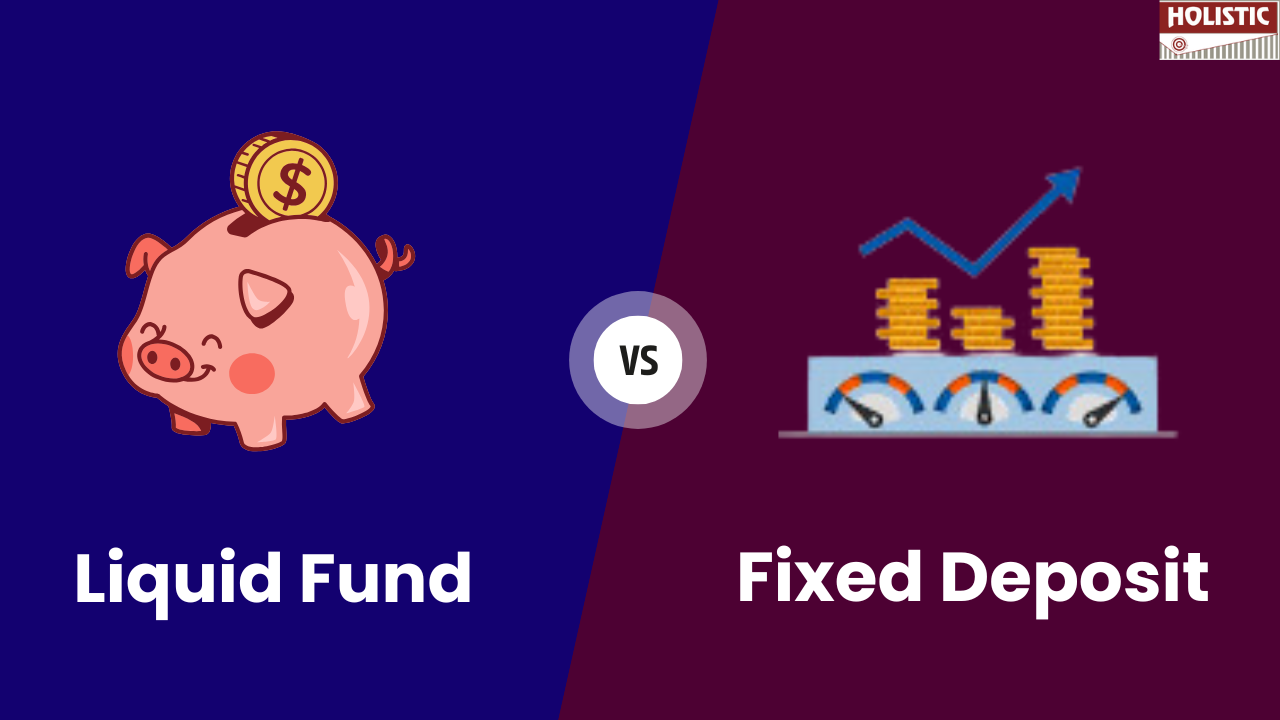If you had to park your hard-earned money somewhere safe, where would you put it?
A fixed deposit, because it guarantees returns? Or a liquid fund, because it offers better flexibility?
For years, FDs have been the go-to choice for many Indian investors.
But as financial markets evolve, are FDs still the best option?
Could liquid funds offer better advantages?
Or do both serve different purposes in a smart investment strategy?
Let’s break it down and help you decide!
Table of Contents
- Understanding Fixed Deposits (FDs)
- Understanding Liquid Funds
- Key Differences: Fixed Deposits vs Liquid Funds
- How to Choose Between Fixed Deposits and Liquid Funds?
- The Role of Taxation in Your Investment Decision
- Conclusion: Which One Should You Pick?
1. Understanding Fixed Deposits (FDs)
What Are Fixed Deposits?
A Fixed Deposit (FD) is one of the simplest investment options available.
You deposit a lump sum with a bank or NBFC for a fixed tenure, and in return, you earn a guaranteed interest rate.
But here’s the real question—do FDs still offer the best way to grow your money safely?
Benefits of Fixed Deposits
- Guaranteed Returns – Can you think of an investment where you know exactly how much you’ll get at the end? That’s the beauty of FDs!
- Safety and Security – What could be safer than an investment insured up to ₹5 lakhs under the DICGC scheme?
- Multiple Tenure Options – Want to invest for just a few months? Or maybe 10 years? FDs offer flexibility in terms of tenure.
- Tax Benefits – Why not reduce your taxable income while growing your savings? Tax-saving FDs allow deductions under Section 80C.
But does this security come at a cost?
What if you suddenly need your money before maturity?
Would you be willing to pay a penalty for an early withdrawal?
Who Should Invest in Fixed Deposits?
- Do you prioritize capital protection over high returns?
- Are you someone who dislikes market fluctuations?
- Do you want a fixed and predictable income source?
If you answered yes to these, then FDs might be your ideal choice.
But if you’re looking for higher liquidity and potentially better returns, is there a better alternative? Let’s explore liquid funds!
2. Understanding Liquid Funds
What Are Liquid Funds?
Have you ever wished for an investment that offers better returns than a savings account but allows you to withdraw money anytime?
That’s exactly what liquid funds do!
Liquid funds are a type of debt mutual fund that invests in short-term, low-risk instruments like;
- Treasury bills
- Commercial papers
- Certificates of deposit
They provide higher liquidity while maintaining relative stability.
But are they as safe as FDs?
Benefits of Liquid Funds
- Higher Liquidity – What if you suddenly need cash? Unlike FDs, liquid funds allow easy withdrawal without hefty penalties.
- Potentially Better Returns – Why settle for lower returns in FDs when liquid funds can offer slightly higher growth?
- No Fixed Tenure – Want to invest for a few weeks or a few months? Unlike FDs, there’s no lock-in period.
- Tax Efficiency – Would you rather pay taxes on interest every year (like in FDs) or only when you redeem your investment?
Sounds like a win-win, right?
But does that mean liquid funds are risk-free? Not quite!
While they are safer than most mutual funds, they are still market-linked.
Would you be comfortable with small fluctuations in returns?
Who Should Invest in Liquid Funds?
- Do you need an investment where you can access money anytime?
- Are you looking for an alternative to your low-interest savings account?
- Do you have a low-to-moderate risk tolerance and want slightly better returns?
If your answer is yes, liquid funds might be a better fit for your short-term investment goals.
But how do they truly compare against FDs? Let’s find out!
3. Key Differences: Fixed Deposits Vs Liquid Funds
| Feature | Fixed Deposits (FDs) | Liquid Funds |
|---|---|---|
| Risk | Extremely low-risk; insured up to ₹5 lakh | Low risk but subject to market fluctuations |
| Returns | Fixed and predetermined | Market-linked; generally higher than FDs |
| Liquidity | Low; early withdrawal incurs penalties | High; funds can be redeemed anytime with minimal exit load |
| Taxation | Interest taxed as per income slab on accrual basis | Income taxes as per income slab only on withdrawal and to the extent withdrawn. |
| Investment Horizon | 7 days to 10 years | No fixed tenure; typically short-term (up to 91 days) |
| Regulating Authority | Reserve Bank of India (RBI) | Securities & Exchange Board of India (SEBI) |
Now that we’ve compared them side by side, how do you decide which one suits you best?
4. How to Choose Between Fixed Deposits and Liquid Funds?
So, should you park your money in an FD or go for liquid funds?
Here’s how you can decide:
- Are you okay with locking in your money for a specific period? If yes, FDs could work for you. If not, liquid funds offer better flexibility.
- Do you prefer guaranteed returns over potential market fluctuations? If certainty is your priority, FDs are safer. But if you can tolerate small variations, liquid funds may provide better returns.
- Do you need your money anytime soon? If so, liquid funds allow easy withdrawal, while FDs may charge penalties for premature withdrawals.
- How important is taxation to you? If you want better tax efficiency, liquid funds may be more beneficial for long-term holding.
The real answer? It depends on your financial goals.
Why not use both for a well-balanced investment strategy?
5. The Role of Taxation in Your Investment Decision
Taxes can eat into your returns, so making an informed choice is crucial.
Fixed Deposits (FDs): Interest is taxed as per your income slab on an accrual basis, meaning you pay tax even if you don’t withdraw it.
Liquid Funds: Tax is applicable only upon withdrawal and only on the withdrawn amount.
So, which one leaves you with more money after tax?
The answer depends on your income bracket and investment duration!
6. Conclusion: Which One Should You Pick?
FDs or liquid funds—what’s the verdict?
If you need stability and guaranteed returns, FDs are the way to go.
But if you prefer higher liquidity and tax efficiency, liquid funds make more sense.
Why not use a mix of both to enjoy the best of both worlds?
However, choosing the right investment isn’t always straightforward.
Have you considered how these investments align with your long-term financial goals?
Are you making the best tax-efficient choice for your income bracket?
This is where consulting a Certified Financial Planner (CFP) can make all the difference.
A professional can assess your financial situation, risk appetite, and future goals to help you craft a well-balanced investment strategy.
After all, why take unnecessary risks or settle for lower returns when expert guidance can optimize your investment portfolio?
So, what’s your next step?
Will you stick with the traditional FD route, explore liquid funds, or create a mix tailored to your needs?
Whatever you choose, ensure it’s an informed decision backed by expert advice!





